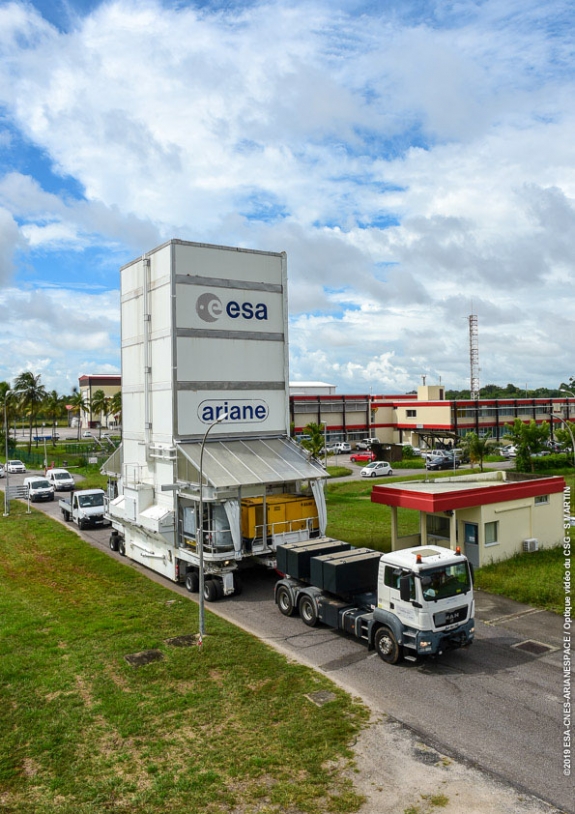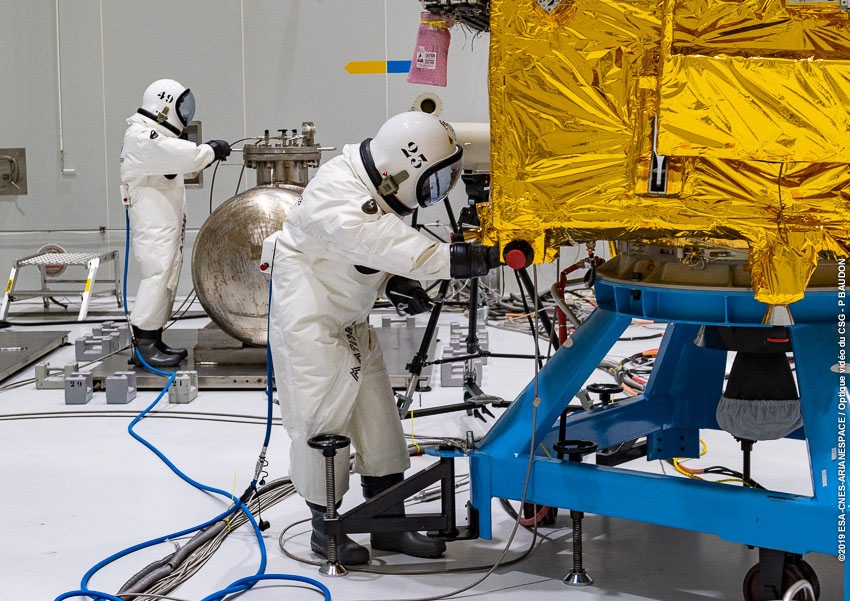Satellite preparation

A unique welcome
The vast majority of satellites arrive in French Guiana by plane, a few weeks before the launch. Transporting them requires huge cargo planes that can carry the containers that keep the satellite safe from moisture, heat and impact.
As soon as a satellite arrives at Félix Eboué Airport in Matoury, the GSC teams receive it and place its container on a tow-truck. This exceptional convoy then heads for Kourou to reach the site where the satellite will be prepared.

Comfortable transport
Transport is an essential aspect in the preparation of satellites, from the moment they arrive at the airport, in the preparation facilities, until they are assembled on the launcher. All measures are taken to avoid any damage. Within the cleanroom facilities, each satellite is moved on trolleys or air cushions. To be transferred from one building to another, the satellite is placed in a dedicated container that keeps it in cleanroom conditions throughout the journey.
Three sites receive satellites at the GSC: S1 at the Technical Centre, S3 on the Ariane and Vega launch complexes, and S5 on the Route de l’Espace. All of them provide customers who come to launch their satellites with furnished offices, a control room, and facilities with all the equipment required for preparing the satellites, whether it is for lifting or supplying them with fluids or electricity.
These rooms are also known as cleanrooms, where the particle concentration in the air is measured and controlled. These measurements are necessary due to the extreme conditions of the space environment: once in orbit, any particles on the satellite could melt or freeze and damage its equipment. For example, anyone operating in the satellite preparation facilities must wear a lab coat, a cap and overshoes and, depending on the operation, gloves and a mask. The cleanroom floors, made of antistatic resin, are also designed to avoid particulate contamination. Temperature, humidity and relative pressure are also maintained at the level required by the customer at all times.
Arrival of a satellite at Félix Eboué Airport
Satellites on a world tour
While the GSC preparation facilities receive the satellites, they are also home to the teams of their manufacturer and their operator. Japanese, Americans, Indians, and Argentinians: they come from all over the world, making the cleanrooms one of the leading venues for international cooperation at the GSC.
The GSC cleanrooms are cleaned daily.
What does preparing a satellite mean?

Inspection and testing of satellites
Electrical checks, integration operations, mechanical checks and more: the satellite undergoes a battery of tests during the weeks from the time it is received by the GSC teams until it is integrated on the launcher.

Filling satellites with fuel
A few days before they are assembled onto the launcher, the satellites are filled with propellants, their fuel. This delicate operation is carried out by the ergoliers (fuel men): in their uniforms which supply them with breathable air, they carry out the filling under the guidance of the nearby control room.

Mounting the satellites under the fairing
When the satellites are ready for launch, they are mounted under the launcher fairing to form the upper composite. This assembly is then mounted on the launcher. During Ariane 5 launches with two satellites, the Ariane dual launch system is also mounted under the fairing: it will release the two satellites into orbit.
Virtual tour of the S5 Payload preparation complex: http://static.zooomez.fr/medias/csg/epcus5/
Virtual tour of the S1 Payload preparation complex: http://static.zooomez.fr/medias/csg/epcus1/
Virtual tour of the S3 Payload preparation complex: http://static.zooomez.fr/medias/csg/epcus3/

